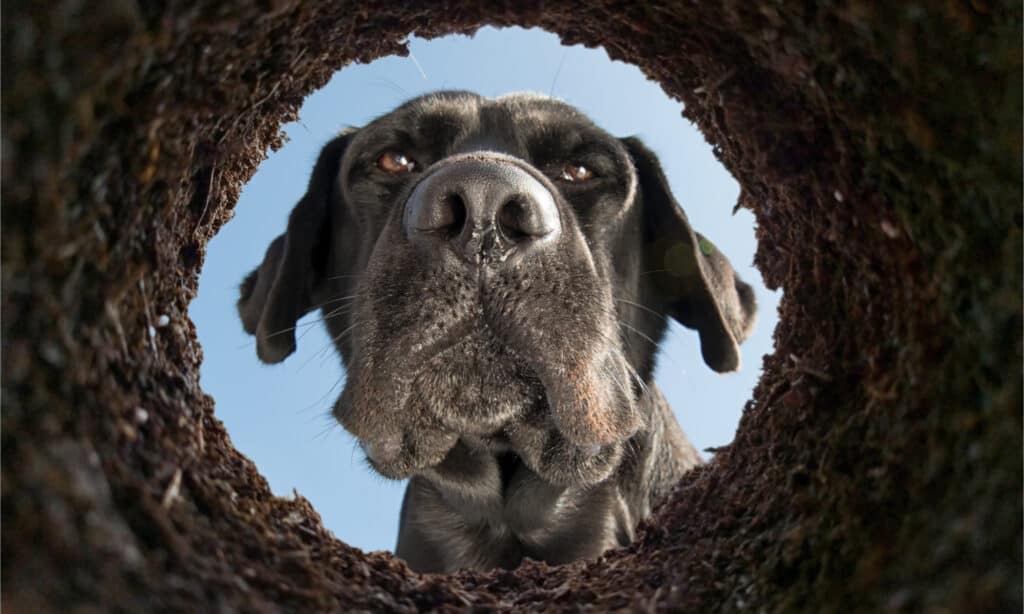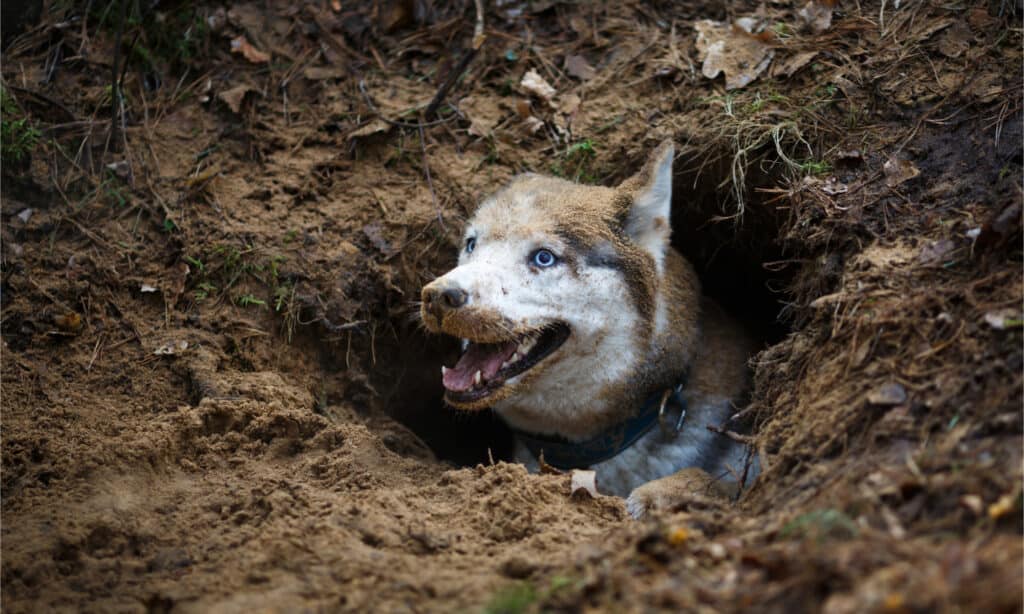We often read about digging being a “problem behavior” in dogs. In reality, it is only a problem when dogs do it in places that we don’t want them to! No one wants to see their carefully manicured lawn getting scratched to bits or a meticulously laid out flower bed destroyed by busy paws. If we can work out why dogs dog holes, we may stand a chance of controlling this urge that they have. As with most dog behaviors, it has its origins in instinct and survival.
Why Do Dogs Dig Holes?
As is the case with a lot of dog behavior, we need to look back at our dog’s ancestry to find most of the answers. When our dog’s ancestors lived in the wild, they would have had to dig to hide from predators, find shelter and hunt prey to help them survive. This behavior is still part of your dog’s instincts and comes as naturally as barking or sniffing the ground.
Obviously, domestic dogs are pampered by their adoring human companions and don’t have to worry about where their next meal is coming from but this instinct remains. Modern dogs dig for slightly different reasons such as looking for prey, relieving boredom, burying items, making a den, and even getting attention, but most reasons can be traced back to their heritage. Let’s unpack some of those reasons in more detail.

Our pampered pups are hardwired to dig for the same reasons their ancestors did: survival.
©majivecka/Shutterstock.com
Digging for Prey
Many dogs have a high ‘prey drive’ and this means that they are constantly on the lookout for small mammals that they would have eaten in the wild. These are the same dogs that will give chase to a squirrel or constantly have their nose to the ground sniffing. Small mammals often live or at least hide, down holes and their scent and droppings will attract a dog’s attention. Dogs are also attracted by fast-moving objects, this is one of the reasons that they chase cars. So, if an insect scuttles down a hole, your dog is quite likely to want to find out where it has gone!
Have you noticed evidence that you have critters in your garden? This could explain why your dog is digging. If it is associated with prey drive, the digging usually takes place in a single area located near roots, shrubs, or rocks and is in a “path” layout.
Relieving Boredom
Dogs with nothing else to do will make their own entertainment but this does not necessarily meet with the approval of their owners! They need to use up energy and they need fun!
Active breeds, terrier breeds, and younger dogs are most likely to dig for entertainment when they are bored. However, all dogs are prone to this if the environment has no toys or playmates, they are left alone for prolonged periods or if they have watched you digging holes yourself recently.
Burying Treasured Items
Dogs can get quite possessive of things with a high value. It dates back to competition for resources amongst dogs in the wild. But this means high value to them, not you! You may not want to go anywhere near a moldy old bone or half-chewed tennis ball that is falling apart, but to your dog, these are pure treasures. And what is the best thing to do with treasure? Bury it!
Dogs also get great pleasure from choosing the best hiding place, digging the hole, dropping in the treasure, and then carefully covering it back up.
Making a Den
In the wild, dogs need a safe and comfortable den to rest in. Some domestic dogs have the same instinctual urge. By digging in the ground, they create a shelter that can be cozy or cool. You may even spot your dog dragging its blanket out there! They may return to an old hole or make a new one every day.
The dogs that are most likely to do this are thick-coated breeds like the Siberian Husky. They really suffer from the heat on hot days. Also, pregnant females have a strong nesting instinct before they whelp and this may involve digging a hole in your garden.
If your dog has no shelter and digs a hole and lies in it, this is probably the reason behind their digging.

Huskies are particularly prone to digging “dens” in the ground.
©Konstantin Tronin/Shutterstock.com
Finding an Escape Route
No matter how comfortable you make their lives, some dogs are free spirits and are desperate to get out of your garden. If you have installed a dog-proof fence, their only choice is to try and get under it! Some dogs have successfully burrowed their way under garden walls and fences. Male dogs that detect the scent of a female dog on heat can be particularly dedicated to finding an escape route!
Easing Stress
Stressed dogs choose to do the strangest things to ease their tension and digging holes is one of them. Because it is a pleasurable activity for them, it makes them feel less stressed. It’s a bit like humans going to the gym when they have had a stressful day at work. Digging is a great outlet when they are feeling overwhelmed.
Lots of things can cause stress in dogs including house moves and introducing a new pet into the home.
A Way to Get Attention
Dogs can start to dig because of any of the above reasons. However, they may carry on digging because of the way in which you react. Don’t forget that dogs prefer any sort of attention to getting no attention at all. So, they soon learn that by digging a hole they can make you come running over and pay them a lot of attention. That is the result they were looking for!
How to Stop Your Dog From Digging
To stop your dog from digging you need to remove the incentives to dig and offer alternatives that your dog will prefer. Here are our top ideas:
- Deter critters from coming into the garden as much as you can by using fences or by making it unattractive to them
- Give your dog loads of mental and physical stimulation. Automatic ball launchers are a great option so are interactive dog toys.
- Take your dog out for lots of walks so that they can explore the neighborhood
- Provide a secure and cozy den using a crate and a crate cover
- In hot weather, use cooling pads or vests to keep your dog cool and make sure that they have plenty of water
- Give your dog attention for being good and not for digging
- Modify fences by extending them into the earth or burying chicken wire at their base (dog-proof fences)
Another approach is to let your dog dig but only in particular areas of your garden. Create a digging spot using a sandbox filled with earth where your dog can dig without causing damage. You could even bury toys for your dog to find. Then, when your dog starts digging in another part of the garden, you can direct them to the “digging zone.”
For true “earthdogs” like Dachshunds and Terriers, there are organized Earthdog Activities where they can search underground for caged rats. They may also enjoy scent work or agility activities.
The photo featured at the top of this post is © Ratikova/Shutterstock.com
Ready to discover the top 10 cutest dog breeds in the entire world?
How about the fastest dogs, the largest dogs and those that are -- quite frankly -- just the kindest dogs on the planet? Each day, AZ Animals sends out lists just like this to our thousands of email subscribers. And the best part? It's FREE. Join today by entering your email below.
FAQs (Frequently Asked Questions)
Which dog breeds dig the most?
All dogs will dig to some extent but some breeds have been bred to dig because humans wanted them to. Terriers are a typical example and are sometimes called ‘earthdogs’ because they will dig into burrows in the earth and risk their own lives to pursue prey.
Do dogs really hide bones in holes?
We’ve all watched cartoon dogs dig holes to bury bones but this is based on real life behavior. Dogs love bones and so they become a treasured possession. They don’t like to share the things that they love so they bury them.
Can I just let my dog dig if they want?
No, simply letting your dog dig wherever they want is never a good idea. On top of the awful mess that it creates in your garden and the trip hazard created by dog holes, it could allow them to escape and put themselves in danger. They could injure a nail from the trauma of digging or unearth dangerous things like buried cables. There are potentially parasites and harmful bacteria living in the soil and toxic materials that may have been buried by previous occupants.
Should I punish my dog for digging?
No, punishing a dog for digging a hole will not work. They are very unlikely to associate digging with the punishment. You will only make them anxious which could make the digging even worse.
Thank you for reading! Have some feedback for us? Contact the AZ Animals editorial team.






